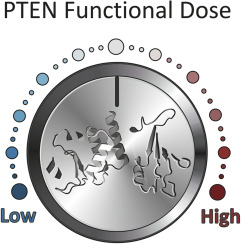当前位置:
X-MOL 学术
›
Cell Chem. Bio.
›
论文详情
Our official English website, www.x-mol.net, welcomes your
feedback! (Note: you will need to create a separate account there.)
The Therapeutic Potential of PTEN Modulation: Targeting Strategies from Gene to Protein
Cell Chemical Biology ( IF 6.6 ) Pub Date : 2017-11-16 , DOI: 10.1016/j.chembiol.2017.10.009 Niall M. McLoughlin , Carolin Mueller , Tom N. Grossmann
Cell Chemical Biology ( IF 6.6 ) Pub Date : 2017-11-16 , DOI: 10.1016/j.chembiol.2017.10.009 Niall M. McLoughlin , Carolin Mueller , Tom N. Grossmann

|
Two decades have passed since the discovery of the tumor suppressor, PTEN. A multitude of biological functions have since been revealed, suggesting potential therapeutic applications for both PTEN activation (e.g., cancer) and inhibition (e.g., neuroregeneration). Nevertheless, PTEN's therapeutic suitability has been called into question due to its “risky” profile as a tumor suppressor. To evaluate PTEN function and its various roles in disease a number of molecules have so far been developed. However, intrinsic problems associated with phosphatase inhibition and PTEN's complex regulation via post-translational modifications hinder straightforward access to selective modulators. For this reason, central questions associated with PTEN targeting remain unanswered. In this perspective, we summarize current PTEN-targeting strategies and discuss potential approaches to modulate its functional dose, considering all stages of PTEN biogenesis from direct protein modulation to the targeting of relevant miRNAs as well as thePTENgene and mRNA.
中文翻译:

PTEN调节的治疗潜力:从基因到蛋白质的靶向策略。
自发现抑癌药PTEN以来已经过去了二十年。此后已经揭示了许多生物学功能,这暗示了PTEN激活(例如癌症)和抑制(例如神经再生)的潜在治疗应用。然而,由于PTEN作为肿瘤抑制因子的“危险”特征,其治疗适应性受到了质疑。为了评估PTEN功能及其在疾病中的各种作用,迄今为止已经开发了许多分子。然而,与磷酸酶抑制和通过翻译后修饰进行的PTEN的复杂调节有关的内在问题阻碍了直接使用选择性调节剂。因此,与PTEN定位相关的核心问题仍未得到解答。从这个角度来看,
更新日期:2018-01-18
中文翻译:

PTEN调节的治疗潜力:从基因到蛋白质的靶向策略。
自发现抑癌药PTEN以来已经过去了二十年。此后已经揭示了许多生物学功能,这暗示了PTEN激活(例如癌症)和抑制(例如神经再生)的潜在治疗应用。然而,由于PTEN作为肿瘤抑制因子的“危险”特征,其治疗适应性受到了质疑。为了评估PTEN功能及其在疾病中的各种作用,迄今为止已经开发了许多分子。然而,与磷酸酶抑制和通过翻译后修饰进行的PTEN的复杂调节有关的内在问题阻碍了直接使用选择性调节剂。因此,与PTEN定位相关的核心问题仍未得到解答。从这个角度来看,











































 京公网安备 11010802027423号
京公网安备 11010802027423号